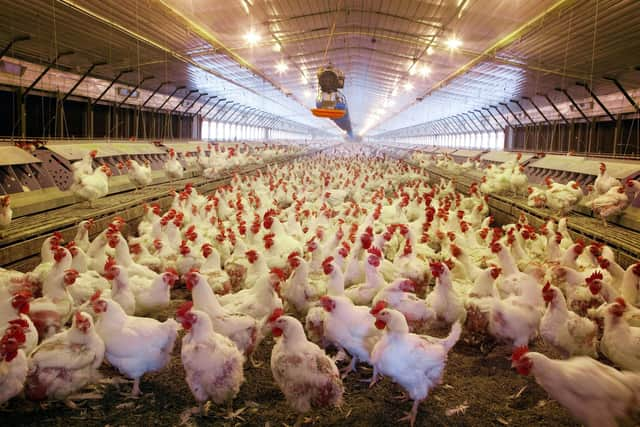We must halt the invasion of the US mega farm to our countryside
Many generations have started out listening to that tale of a farmer and his various animals in perhaps the world’s most recognisable nursery rhyme. That early childhood imagery has been one that marketeers have been keen to perpetuate. Selling us the image that farming remains a bucolic practice with a few animals here and there. Many of us know that farming isn’t always like that. But the true scale of what’s going on has long remained hidden, until now.
New data reveals that some of the most beautiful tracts of our countryside are being invaded by the march of the mega-farm.
Advertisement
Hide AdAdvertisement
Hide AdThe UK has seen a 20 per cent increase in the number of US-style mega-farms – large-scale intensive farming units – since 2016. These are huge industrial units where the animals never go outside or feel the grass at their feet. Hotspot regions at the forefront of this invasion include Lincolnshire, Shropshire, Norfolk, and Scotland.


In 2023, there were 1,176 US-style mega-farms in the UK as a whole compared with 974 in 2016. In Scotland alone, the number of mega-farms for pigs has doubled since 2017, whilst massive poultry units have increased by a fifth.
This surge in mega-farms comes despite government assurances that it wouldn’t happen.
In 2017, then Environment Secretary, Michael Gove said, “One thing is clear: I do not want to see, and we will not have, US-style farming in this country. The future for British farming is in quality and provenance, maintaining high environmental and animal welfare standards.”
Sadly, successive ministers have let things slip.
Mega-farms blight local communities, whose lives can be dogged by the pervasive stench, noise, and biodiversity loss. Rivers become polluted.
An “agonising death” is how Charles Watson, founder of River Action, has described the plight of the River Wye, a watercourse that has come to symbolise what’s going on.
Earlier this month, Watson wrote: “This magnificent watercourse, so often voted our country’s most loved river, has in recent years been assaulted by a deluge of pollution from intensive agriculture, causing prolonged algal blooms which turn the river each year into a putrid green soup, snuffing the life out of the river by starving it of oxygen and light.”
Local government is on the front line in granting planning permission for new mega-farm units. Unfortunately, they are often unaware that animal welfare and climate change issues can be a material consideration in planning decisions.
Advertisement
Hide AdAdvertisement
Hide AdAnd here’s where the spotlight falls once again on Michael Gove, at least down south, this time in his role as Secretary of State for Levelling Up, Housing and Communities.
That’s why I’ve written to him and his Scottish counterpart, Joe FitzPatrick, Minister for Local Government and Planning, asking for laws to be strengthened so that there can be no doubt that animal welfare and climate change are material considerations in planning decisions. This will help communities persuade local authorities to reject such applications.
In this way, we can help halt the mega-farm invasion and all that it entails.